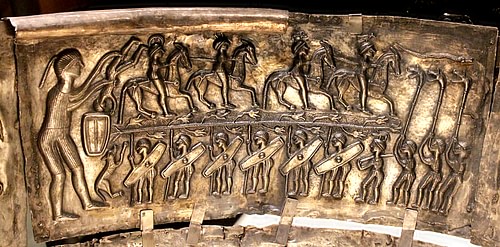
Celtic image of rebirth on Gundestrup Caludron
The uncertainty around death and the afterlife is almost universal, as a child my first questions relating to spirituality were "What happened before I was born", and "What happens after we die"? The Oera Linda book puts forward a new perspective on spirituality so I think it's important to look into these primary questions through the lens of Frya's religion. This post will also touch on some more mystical elements of the OL and also some seemingly irregular views seen throughout the book.
When reading my 2022 Full size translation a footnote by Jan in particular stood out to me. When Hidde Over de Linde tells his son he must guard these books with life and soul, he brings up:
Now if Hidde had preserved Frya religious beliefs, that'd mean that some form of reincarnation was an accepted belief among the Fryas. This doesn't seem to be touched on again, but there are some some fragments relating to what happens after death. For example, in "Demetrius and Friso",The distinction between life and soul might suggest that the author believed that the soul can continue to guard the scriptures between lives or subsequent incarnations,
the messenger in this book references a Walhalla, which seems to be the origin of what we know today as the 'viking valhalla' (a concept that was twisted by the Magyar to promote/justify their wars?). This fragment also implies that if you die with a defiled soul IE you betrayed the 'Even', you cannot enter this realm and are stuck in the material world, a ghost.against your will, your body was defiled. For that, you are not to blame. But if you defile your soul, you will never reach Walhalla.[8] Your soul will then wander the earth, never able to see the light. Like bats and owls you will hide in your hole by day, and come out at night, crying and howling upon our graves, while Frya must turn her head away from you.
'Watch Stars' seem to have relevance to the afterlife. Frya, Finda, and Lyda are all said to have ascended to 'Watch stars' after death, where Frya (at least) would have a role of protecting spirit along with her seven maidens. We see her spirit being invoked so it seems that spirits on this level are there for guidance and are worthy of veneration, not unlike Christian saints.
The final insight into what happens after death has to deal with the metaphysics around Wralda and his soul. We know that everything in life and our world are temporary blips in his being. To visualize, Wralda would be an ocean and everything we know including ourselves are waves on the surface. When it is said in Primal Teachings 1:
In the beginning, we borrow life force from his spirit and incarnate, and in the end we flow back to Wralda, both our physical body decomposing into elements and our soul returning to where it came, again like waves dissipating back into the sea.All that we can see of him are the created beings that come and go again through his life, because from Wralda all things proceed and to him they return.
Out of Wralda comes both the beginning and the end. All things merge into him.
Wralda is the only almighty being, because all other power is borrowed from him and returns to him.
From Wralda, all forces are derived, and all forces return to him again. Therefore, he alone is the creative being, and nothing is created outside of him.
There seems to be some discrepancies between all of these fragments that need to be sorted out. Of course we won't get our complete answer until after we die, however I think we should start doing more comparative research. For example we know that many ancient sites researchers attribute to Celts would have actually belonged to Fryans. Perhaps by looking at the artifacts found there with the knowledge of the OL we can gain some more insight. For example, going back to the reincarnation narrative. It's commonly known that the Celts believed in reincarnation that had to do with ancestry, not karma. This I feel would be more in line with Frya thinking than karmic reincarnation found across asia.
There are also some inconsistencies with beliefs it seems. We see in multiple instances especially with Kalta that sorcery witchcraft is real and can influence others, however in another instance belief in witchcraft is mocked. We also know from the Demetrius and Friso chapter that there is a legitimate belief in ghosts, and later a belief in spirits was mocked.
My theory is that due to the high levels of superstition enemies of Fryas folk had, there was a cultural shift that headed towards a more atheistic view of the world to distance themselves from the enemy. I'm curious to know what other people on this forum think about the religious beliefs established by the OL.Among our people, it had come to be that many women — and even men — whispered about ghosts, elves, and gnomes, like the Danes. Askar had taken advantage of all this superstition, and we now intended to do the same for our benefit. On a dark night, I brought the maidens to the bastion, whereupon they went about dressed in white cloth, haunting the maze of paths so that no one afterwards dared go there.